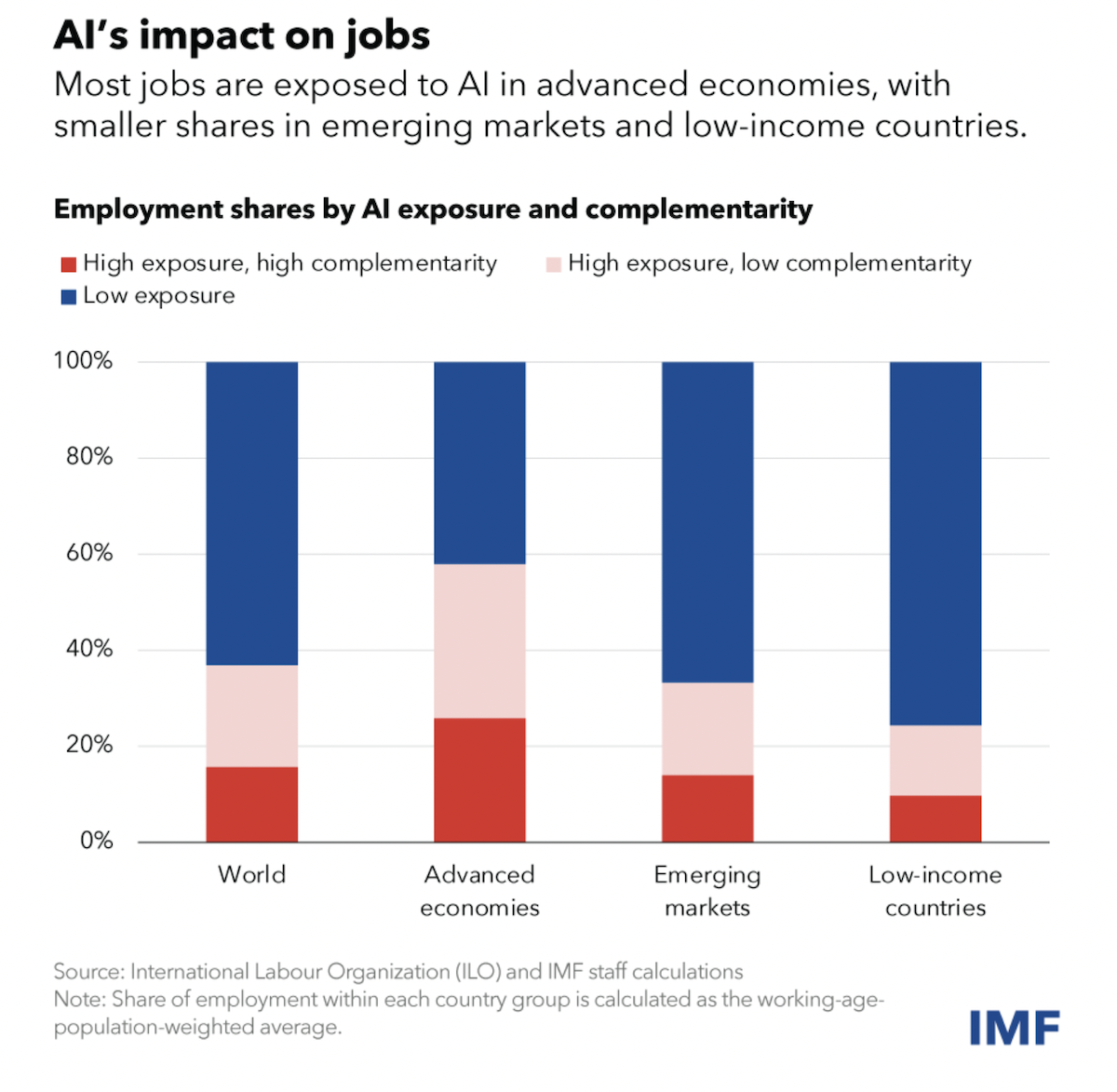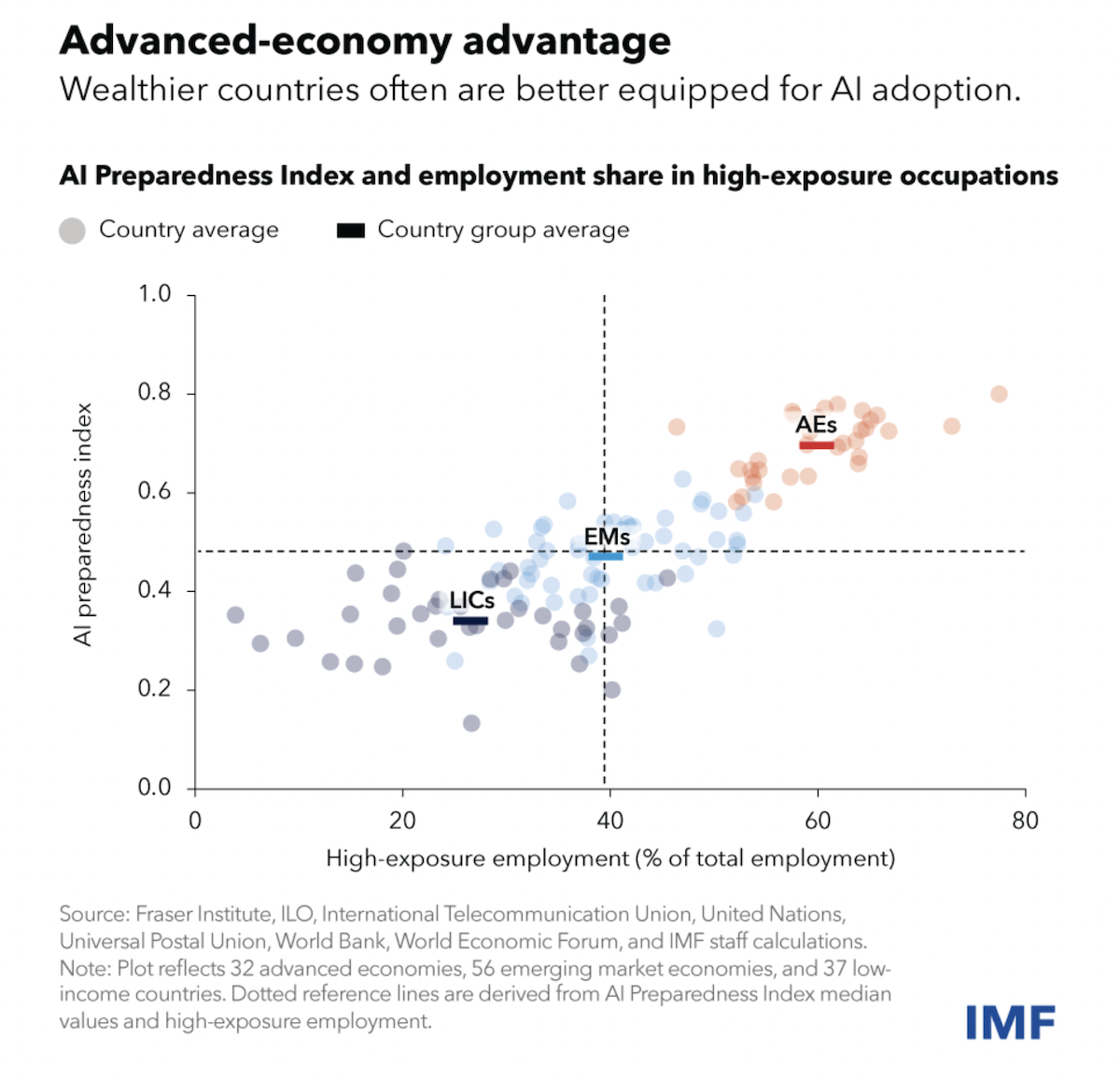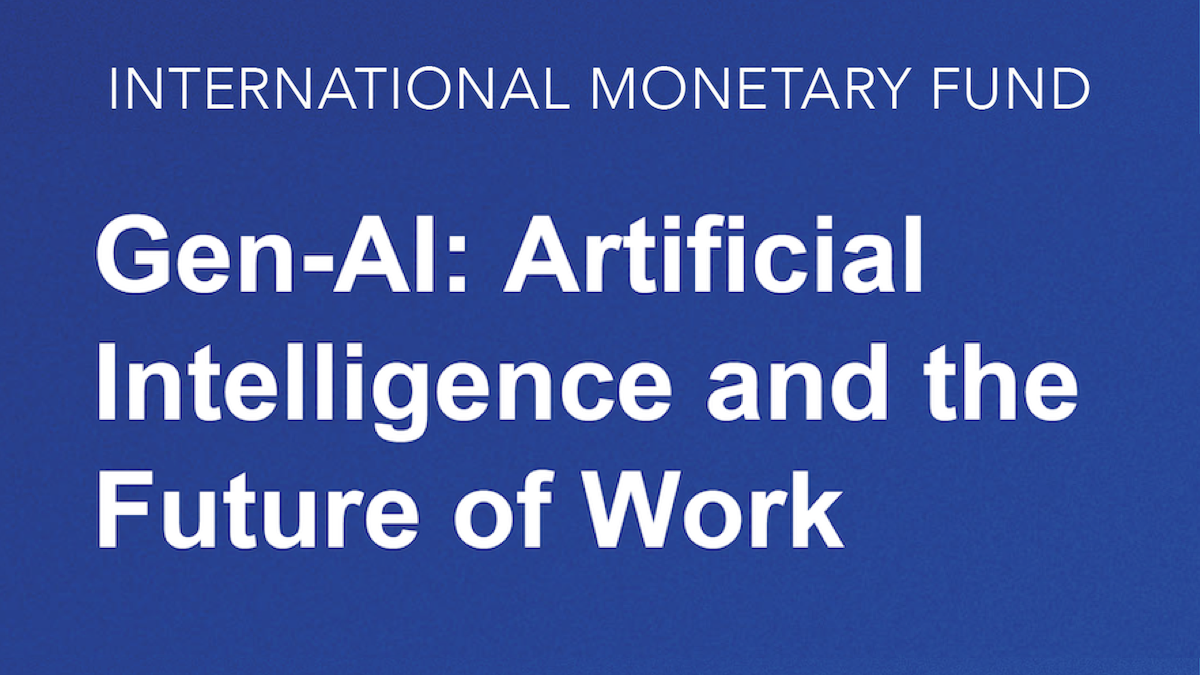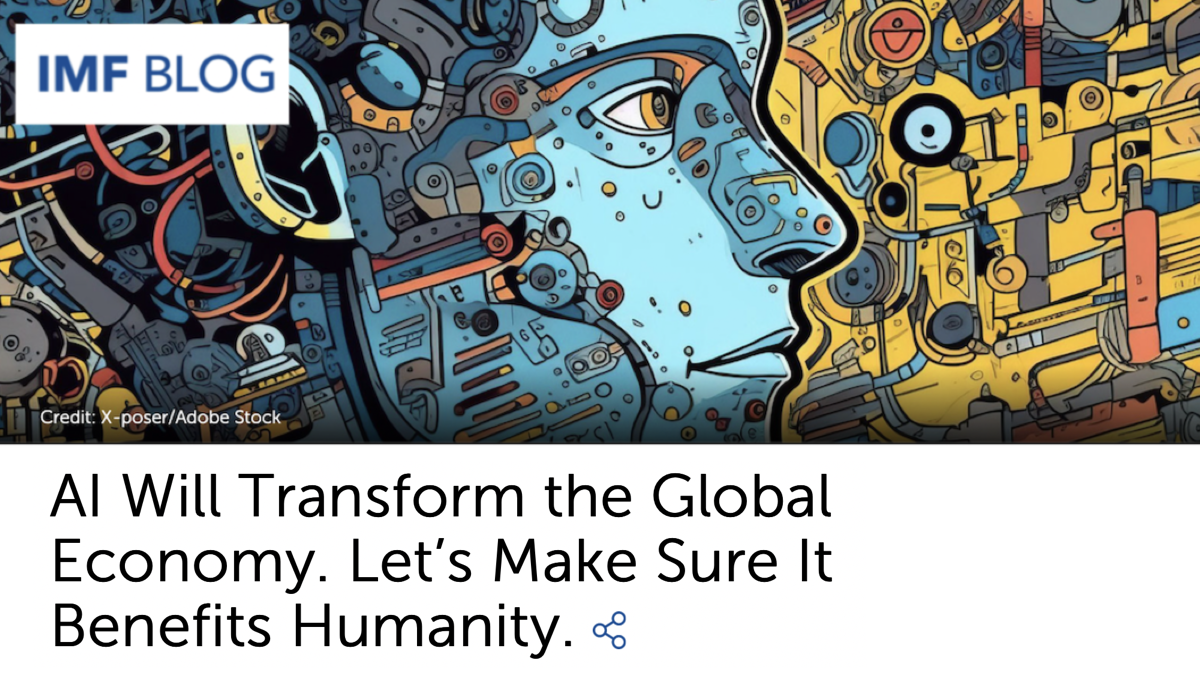IMF Blog. AI Will Transform the Global Economy. Let’s Make Sure It Benefits Humanity.
AI will affect almost 40 percent of jobs around the world, replacing some and complementing others. We need a careful balance of policies to tap its potential.
Kristalina Georgieva
January 14, 2024
We are on the brink of a technological revolution that could jumpstart productivity, boost global growth and raise incomes around the world. Yet it could also replace jobs and deepen inequality.
The rapid advance of artificial intelligence has captivated the world, causing both excitement and alarm, and raising important questions about its potential impact on the global economy. The net effect is difficult to foresee, as AI will ripple through economies in complex ways. What we can say with some confidence is that we will need to come up with a set of policies to safely leverage the vast potential of AI for the benefit of humanity.
Reshaping the Nature of Work
In a new analysis, IMF staff examine the potential impact of AI on the global labor market. Many studies have predicted the likelihood that jobs will be replaced by AI. Yet we know that in many cases AI is likely to complement human work. The IMF analysis captures both these forces.
The findings are striking: almost 40 percent of global employment is exposed to AI. Historically, automation and information technology have tended to affect routine tasks, but one of the things that sets AI apart is its ability to impact high-skilled jobs. As a result, advanced economies face greater risks from AI—but also more opportunities to leverage its benefits—compared with emerging market and developing economies.
In advanced economies, about 60 percent of jobs may be impacted by AI. Roughly half the exposed jobs may benefit from AI integration, enhancing productivity. For the other half, AI applications may execute key tasks currently performed by humans, which could lower labor demand, leading to lower wages and reduced hiring. In the most extreme cases, some of these jobs may disappear.
In emerging markets and low-income countries, by contrast, AI exposure is expected to be 40 percent and 26 percent, respectively. These findings suggest emerging market and developing economies face fewer immediate disruptions from AI. At the same time, many of these countries don’t have the infrastructure or skilled workforces to harness the benefits of AI, raising the risk that over time the technology could worsen inequality among nations.

AI could also affect income and wealth inequality within countries. We may see polarization within income brackets, with workers who can harness AI seeing an increase in their productivity and wages—and those who cannot falling behind. Research shows that AI can help less experienced workers enhance their productivity more quickly. Younger workers may find it easier to exploit opportunities, while older workers could struggle to adapt.
The effect on labor income will largely depend on the extent to which AI will complement high-income workers. If AI significantly complements higher-income workers, it may lead to a disproportionate increase in their labor income. Moreover, gains in productivity from firms that adopt AI will likely boost capital returns, which may also favor high earners. Both of these phenomena could exacerbate inequality.
In most scenarios, AI will likely worsen overall inequality, a troubling trend that policymakers must proactively address to prevent the technology from further stoking social tensions. It is crucial for countries to establish comprehensive social safety nets and offer retraining programs for vulnerable workers. In doing so, we can make the AI transition more inclusive, protecting livelihoods and curbing inequality.
An Inclusive AI-Driven World
AI is being integrated into businesses around the world at remarkable speed, underscoring the need for policymakers to act.
To help countries craft the right policies, the IMF has developed an AI Preparedness Index that measures readiness in areas such as digital infrastructure, human-capital and labor-market policies, innovation and economic integration, and regulation and ethics.
The human-capital and labor-market policies component, for example, evaluates elements such as years of schooling and job-market mobility, as well as the proportion of the population covered by social safety nets. The regulation and ethics component assesses the adaptability to digital business models of a country’s legal framework and the presence of strong governance for effective enforcement.
Using the index, IMF staff assessed the readiness of 125 countries. The findings reveal that wealthier economies, including advanced and some emerging market economies, tend to be better equipped for AI adoption than low-income countries, though there is considerable variation across countries. Singapore, the United States and Denmark posted the highest scores on the index, based on their strong results in all four categories tracked.

Guided by the insights from the AI Preparedness Index, advanced economies should prioritize AI innovation and integration while developing robust regulatory frameworks. This approach will cultivate a safe and responsible AI environment, helping maintain public trust. For emerging market and developing economies, the priority should be laying a strong foundation through investments in digital infrastructure and a digitally competent workforce.
The AI era is upon us, and it is still within our power to ensure it brings prosperity for all.
—For more on artificial intelligence and the economy, see the December issue of Finance & Development, the IMF’s quarterly magazine.

IMF managing director on AI’s impact: New social safety nets may be needed – Yahoo Finance
The AI revolution may exert pressure on governments to enact new social safety nets to protect people who lose their jobs but are unable to upskill themselves, warns the head of the International Monetary Fund (IMF).
“If we don’t have thoughtful distribution of benefits [of AI] and inequality grows dramatically, that can break the social fabric in a way that is going to be very unhealthy for the world,” IMF managing director Kristalina Georgieva tells Yahoo Finance Live. “Social safety nets in a world of artificial intelligence are paramount.”
Georgieva’s comments come amid the release of an extensive IMF study on the global economic impact of AI’s proliferation on Sunday. The findings coincide with the 2024 World Economic Forum in Davos, Switzerland, where AI will be a hot topic amongst high-profile tech attendees such as Microsoft (MSFT) co-founder Bill Gates, OpenAI’s Sam Altman, and Salesforce (CRM) CEO Marc Benioff.
Those social safety nets may need a hefty amount of funds, if the IMF’s findings are any indication.
About 40% of global employment is exposed to AI, according to the IMF. In advanced economies, roughly 60% of jobs are exposed to AI due to the prevalence of “cognitive task” oriented jobs. Overall exposure is 40% in emerging markets and 26% in low-income countries, says the IMF.
Although many emerging markets and developing economies may experience less immediate AI-related disruption, the IMF reasons they are also ready to capitalize on AI’s advantages. This could “exacerbate” the “digital divide” and “cross-country income disparity,” the study concludes.
Georgieva thinks the elderly could see an outsized impact from AI’s widespread adoption and be in need of a social safety net.
“You have to be able to support those that fall off a cliff because their jobs are wiped out. We also look at who are most adaptable. Obviously the younger generation, in some areas, women more adaptable, but in others less. And the older generation may need more support to catch up in this new world,” Georgieva adds.
The IMF isn’t a singular voice on possible economic aftershocks from AI.
In research of its own in 2023, Goldman Sachs economists found that advances in AI could expose the equivalent of 300 million full-time jobs globally to automation. In other words, job loss.
Goldman’s economists projected that roughly two-thirds of US occupations are exposed to some degree of automation by AI.
Look no further than the news industry as a prime example of what the IMF and Goldman are discussing.
Large language models (LLMs) are well down the path of ingesting news and information and spewing it out to the global masses, lessening the need to visit a website. Media organizations, meantime, have moved to automate some functions of newsrooms to increase content quantity and slash costs.
News Corporation CEO Robert Thomson (NWSA) told Yahoo Finance Live in late 2023 that AI will be “epochal” for news.
Thomson went onto warn that the industry could face a “tsunami potentially of job losses” due to the new tech.
“These are not just jobs lost, it’s insights lost. So it’s important that all media companies understand the impact, but also, it’s incumbent on the big AI players to understand their impact,” Thomson added.


